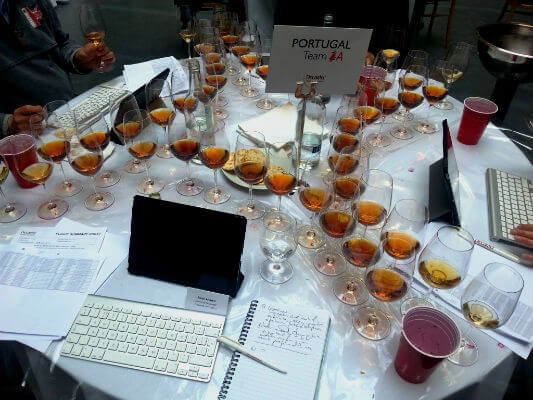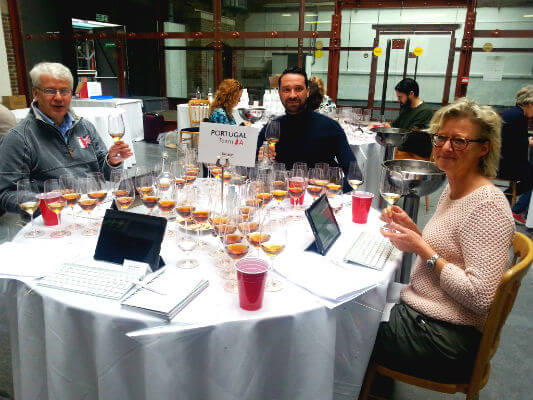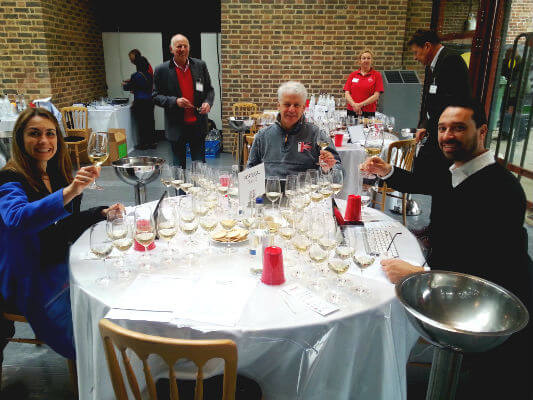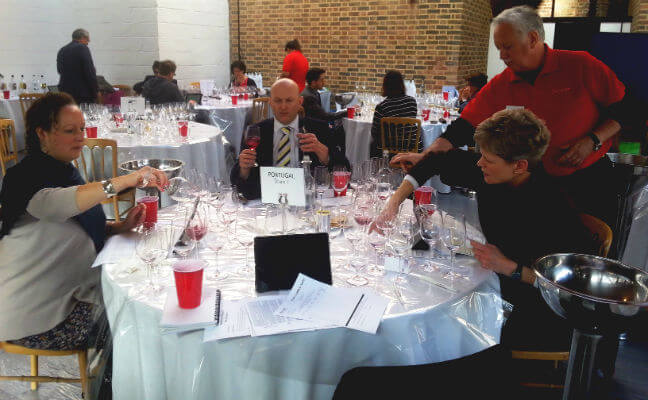Text Sarah Ahmed
Since 2011, it has been my great privilege to Chair the Portugal panel at Decanter World Wine Awards (“DWWA”), which lays claim to being the world’s largest and most influential wine competition. There were over 16,000 entries this year, 730 from Portugal (excluding Port and Madeira); you can catch up with the results on Decanter’s website on 14 June.

Going for Gold: The A Team, Decanter World Wine Awards 2015 – Photo by Sarah Ahmed | All Rights Reserved
Judged by experts in their field, each year my distinguished panel includes key opinion formers and fellow champions of Portuguese wines. This year, I took the opportunity to sound out their views on how Portuguese wine is performing in their market (principally the UK, which is widely regarded as a shop window for the world). My contributions come from:
- Danny Cameron, Director of UK-based specialist Portuguese importer Raymond Reynolds, who work with some of the best known premium producers in the business.
- Nick Oakley, founder of UK-based specialist Portuguese importer Oakley Wine Agencies, who have counted almost all of the multiple supermarkets as clients.
- Jo Locke, Master of Wine and Portugal buyer at UK mail order/online retailer The Wine Society, who have most deservedly received multiple awards for their Portuguese list.
- Anne Forrest, former Portugal buyer for Direct Wines now Oporto-based Director at Vinos Sin Fronteras, Lda, a specialist wine export and consultancy business.
- Claudio Martins, UK-based former sommelier/Manager, New Street Wine Shop, now Wine Director, Montevino Partners Wine Merchants.
- Madeleine Stenwreth Master of Wine, Swedish-based freelance wine consultant specialising in product development, blending, quality and style strategy.

Nick Oakley, Claudio Martins, Madeleine Stenwreth Master of Wine, Decanter World Wine Awards 2015 – Photo by Sarah Ahmed | All Rights Reserved
Have you noticed an increase in the sales, quality and range of Portuguese wines and, if so, what?
Danny Cameron: In the UK, I see the sales’ sweet spot in retail between £8 and £15. Since the lovely Lehmann Bros did their thing [the global financial crisis], the market for high end Portugal has struggled, even for some of the iconic labels. This suggests that Portugal is not yet fully trusted by these potential consumers, who in recessions typically default to what they consider safe choices.
Nick Oakley: Yes, plenty. We are aiming for 20% growth in volume, even more in value. We are on target after 4 months.
Jo Locke MW: Yes, we have seen an increase in sales, largely due to increased focus on the region (dedicated sales activity and greater presence in standard mailings), but also thanks to now regular tastings of Portuguese wines.
Anne Forrest: We have certainly noticed an increase in sales in the last year, particularly with a marked growth in the fortified sector of ‘special categories’ ie. not just basic Ruby, Tawny, White Port. There is a lot of interest from small and large retailers alike in finding something really special which delivers the ‘wow’ factor to customers when they have the first sip. Aged Colheitas, Tawnies and Moscatel de Setubal have been proving surprisingly popular. We have also noticed growth in Vinho Verde and wines labelled by single varietal or leading strongly with the region on the label.
Claudio Martins: There is a new wave of Portuguese wines in the UK for sure, wine lists in restaurants are increasing their offers with wines from Minho, Douro, Alentejo and some Dão wines with a different price category which is great. The consumer is more aware of Portuguese wines nowadays.
Madeleine Stenwreth MW: Quality is constantly improving; the trade knows it, but consumers still have to be even more convinced that they can trust the origin before they fully dare to go down that route. It’s not easy to grab the consumers’ attention unless the wines are sold under a well-respected/well-known brand, possibly even signed off by the winemaker (João Portugal Ramos being a case in point) to create that trust that Portugal still needs to build. Wines are constantly launched but there is no real staying power on the shelf. The category is too fragmented and complicated for consumers to get their head around what you can expect from the different regions. This means consumers need a trusted brand to hang on to. I think there is a problem with too many names that say nothing to the consumers.
Which categories of Portuguese wine (by style, region, variety) are proving most popular with consumers?
Danny Cameron: In marketing terms, the regions who have invested more or less in promoting their region seem to be yielding results.
Nick Oakley: Dão, Douro and Vinho Verde (new wave single varietal). The Dão has been particularly successful in all categories – independents, supermarkets, online and on trade/restaurants (via wholesalers). For Vinho Verde, single varietals Arinto and Avesso have been successful so far, joining Alvarinho. There’s no reason that Loureiro should not join them.
Jo Locke MW: Vinho Verde is the current star, at all price levels.
Anne Forrest: Dão is selling really well at the moment with both red and white blends proving popular. As a region, Dão seems to be gaining more and more traction as styles are quite consistent across brands and customers are confident to make repeat purchases as they know they will like what they get in the bottle. It also offers good value for money and just enough complexity to keep customers intrigued and wanting more.
Claudio Martins: Wines from Minho for sure and Douro reds are still pretty much the demand of the normal clientele in a wine shop or restaurant.
Madeleine Stenwreth MW: Reds of commercial quality with obvious fruit concentration yet with attractive soft, rounded tannins and drinkability with or without being accompanied by food.

Beatriz Machado, Nick Oakley, Claudio Martins, Decanter World Wine Awards 2015 – Photo by Sarah Ahmed | All Rights Reserved
Which categories (by style, region, variety) most impress you; where do you expect to see further growth?
Nick Oakley: For me Dão is the biggest story, and my favourite area. One extra is that we have developed a ‘Californian lookalikey red’, with 14 grams of sugar, in the style of Apothik. It’s called Wolf & Falcon and it’s been developed by Laithwaites. Here I think it is wine style and branding that have won out over provenance.
Jo Locke MW: VinhoVerde has further potential; Dão seems to be under represented and could and should do more.
Anne Forrest: Alentejo is the region which has most impressed me this year. This is the region that the Portuguese love to drink from and it seems to have a great emotional pull for Portuguese customers choosing wine to drink at home or in restaurants. There is a lot of competition on the domestic market with many up and coming brands / wineries which are fighting to establish themselves and this is driving the quality upwards. Alentejo is starting to gain reputation abroad and I think it will eventually come to be viewed as ‘a safe bet’ by customers in the UK and elsewhere with a small number of really top producers leading the way.
Claudio Martins: Dão wines have so much to offer and the Touriga Nacional in the region has what UK clients are looking for. I expect to see more growth in Lisbon wines – if they do a good marketing campaign for the UK market I believe people will start to recognise the wines.
Madeleine Stenwreth MW: Well-made reds with a flirty commercial edge while maintaining a purity and honesty of fruit. The Douro has come so far. Alentejo has dared to move away from having been overripe, clumsy and over-oaked with issues of dying young in bottle. At the top end, a very few have understood that you can come a very long way with elegance without being lean. As for whites, the highs at DWWA were definitely some of the whites [watch out for the DWWA results]. World class stuff!

Anne Forrest, Matthieu Longuere Master Sommelier, Jo Locke Master of Wine, Decanter World Wine Awards 2015 – Photo by Sarah Ahmed | All Rights Reserved
Where do you think there is scope for improvement?
Danny Cameron: I think the overall quality of packaging of Portuguese wines is 100% better than a few years ago. But the country is still short of potentially major brands which can perform in the UK market.
Nick Oakley: tannin management in the south. Labelling by appellation, rather than brand (like in France). This is working in the Dão. At the moment you have thousands of brands trying to get noticed and no-one succeeding. Let’s label Dão as Dão and Douro as Douro, forget the branding – or at least diminish its importance. Only this way will the buying public get to know the wines.
Jo Locke MW: Corks are the number one issue by far. How is it that Portugal produces so much yet reserves the worst for itself? The number of top wines with poor corks is shocking and does nothing for her reputation. Rosé is not taken seriously but I see no reason why Portugal could not produce lots of good examples. For us the good dry rosé market is still dominated by the south of France and need not be. Oh, and the small issue of self-belief!!
Anne Forrest: A little bit more self belief would go a long way I think! The producers who are really getting out there, not taking a back seat, meeting customers, finding out about the markets and actively promoting their wines are finding routes to market. I think Portugal is on the right track so let’s just have more of the same please!!
Claudio Martins: Marketing actions, consumer tastings, consumer tastings, consumer tastings, it’s the only way to get Portugal on the map for UK consumers, the trade knows already the potential of the wines and the quality but the consumer needs to ask for it.
Madeleine Stenwreth MW: Design is so important and this together with good wine and continued generic educational efforts will help Portugal progress in the right direction. João Portugal.Ramos is an example of constantly working on improving quality and style, very alert on packaging upgrade to keep the consumer happy and never disappoints. Consistency is key for long term shelf life.
To conclude, fellow writer Jane MacQuitty joined my panel for one day again this year; she has been the wine and drink correspondent for The Times since the 1980s. This is what she had to say, “[A]s you know, I am a big fan of Portuguese wine, but I still feel that the country is the dark horse of Europe with bags of potential in the shape of oodles of indigenous grape varieties, plenty of unique regional and other wine styles. Vinho Verde is I think tip for the top, but I feel that the Dao both white and red will produce lots of wow wines in the future. All in all, Portugal just needs to hurry up and join the 21st Century.”




Leave a Reply